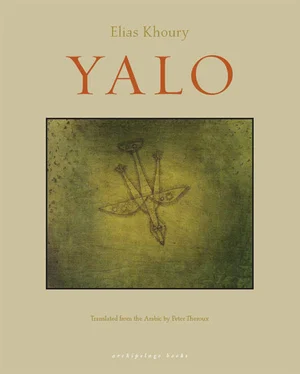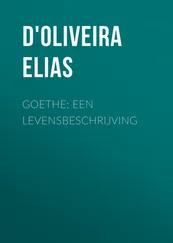My name is Yalo, Daniel Jal’u, the son of George Jal’u, nicknamed Yalo, from the Syriac Quarter in the Mseitbeh district of Beirut. My mother is Gaby, Gabrielle Abel Abyad. I am an only child, I have no brothers or sisters. I lived with my mother and grandfather. I never knew my father, and my grandmother died before I was born, so I don’t remember her at all, and my father I never knew because he left when my mother was in her seventh month of pregnancy with me. That’s what they tell me. They said he emigrated to Sweden, and that my grandfather kicked him out of the house when he found out that he wasn’t a Syriac. I don’t know anything more about him. I know that my grandfather, the cohno Ephraim Abyad, consented to my mother’s marriage to him in order to solve a major problem. My mother was in love with a married man, twenty years her senior. She worked for him in a sewing shop. His name was Elias al-Shami and he was a famous tailor. I don’t know him well. He used to visit us sometimes at home, and take me on errands with my mother. I remember his eyeglasses and his eyebrows, which were thick and gray. I was afraid of him and his black eyeglasses. Then suddenly he stopped visiting us, after my grandfather found out that my mother went back to her relationship with the tailor. My mother swore to my grandfather that I was not the tailor’s son, but the son of George Jal’u. My grandfather didn’t believe her, but what’s the difference? Whether one or the other had been my father, it wouldn’t change anything in my life because my real father was my grandfather the cohno .
My mother married my father when she was twenty, so my mother is only twenty-one years older than I am. I love her very much. My grandfather discovered that George Jal’u was a liar, and when my father decided to emigrate, my grandfather refused to let my mother go with him. He told him, Go and do your best and later on you can send for your wife. Now your wife is pregnant and has to look after her health. So he went and didn’t come back. They say he had not gone to Sweden but had returned to Aleppo, because he was from a rich Aleppan family that went broke. They worked in dovetailing and inlaying wood, but the business failed. My father came to Beirut and worked in the shop of Salim Rizq, who was blind. Salim was a friend of my grandfather’s, but my father robbed him. That’s how my grandfather knew that my father was an Aleppan from the Greek Catholic sect, like Mr. Rizq, and a liar and a thief. When my grandfather got mad at me, he’d tell me I was turning out like my father and I’d be a thief like him and I should go to Aleppo to look up my family tree, because I had no origins. Then he came back sorry and said I was his only son, since God had not blessed him with a son, but had given him two daughters, my mother and my aunt Sara, who married Jacques Kassab and went to Sweden with him. There they speak Suryoyo in the street, and they have Suryoyo radio and television, but that’s no good because a language separated from its land dies. God had compensated him with me; he sent him Jal’u’s son so that he could have a boy, and that he was like the prophet Zachary. He was struck dumb before my mother gave birth to me. He remained unable to speak for three days. Later on, when my mother was in labor, he spoke, and said I was a boy, and that he had seen the prophet Daniel in a dream, and that’s why they named me Daniel, and I was called Yalo.
My full name is Daniel George Jal’u, born in Beirut in 1961. I went to the St. Severus School in the Syriac Quarter in the Mseitbeh district. During the summer I worked in Mr. Rizq’s shop. Then the war started. We had to move to Mrayyeh Street in the Ain Rummaneh neighborhood, and I went to school at Atchaneh and then transferred to the Taqaddum School near the Myrna Chalouhi Center in Sinn al-Fil. In 1979 I joined the Lebanese Forces and became a fighter, and remained a fighter until 1989. I submitted to several military courses in Dhuhr al-Wahsh, but I didn’t go to Israel for training; I wasn’t qualified for paratrooper training because of my height. I am very tall — 191 centimeters. Some of the guys in my company, which was called the “Billy Goat Company,” went there and trained, that is true, but me, no. My friend Tony Atiq took me to a training course and told me that Mr. Nabil Ephraim was recruiting Syriac guys and that we now controlled the biggest barracks in Achrafieh, the Georges Aramouni Barracks.
During the war I got to know a lot of guys, especially the Syriac guys who had come from Syria. They joined the war so they could get Lebanese citizenship. We fought, and a lot of us died, and we stole some, as everyone did who had fought, but we were afraid, especially the Syrian guys, because their dialect wasn’t Lebanese, and there was the danger that they’d get stuck at our checkpoints, and it was a lot of work for Mario, our company commander.
In late 1989 I was depressed about everything. It was Tony Atiq’s idea to move to France. Tony and I stole the money from the barracks and escaped to France. We went by sea from Jounieh to Cyprus, and from Cyprus we flew to Paris. That was the first time in my life I was on a plane. I enjoyed the plane a lot, but Tony drank a lot of whiskey and threw up, and embarrassed us. But flying in the plane was wonderful. In Paris, Tony left me in the hotel and took the money. He ran away and left me stranded. Didn’t have a single franc. He was the money man for the trip, and the money disappeared. I don’t speak French. I left the hotel and became a clochard . That’s what they call homeless people there. I became a clochard , and didn’t have the price of a bite of bread. That is, I became a beggar sleeping in the Métro tunnel at Montparnasse Station.
I met Monsieur Michel Salloum, may God honor him, in the Métro station. He took me to his house at 45, rue Victor Hugo, bathed me, dressed me in new clothes, and fed me. When he’d heard my story he offered me a job in Lebanon. He said he did not like young militia guys, but he saw in me someone different, from a good family, and that my grandfather the cohno had interceded with him for me. I went back to Cyprus by plane, and enjoyed it. I drank only one glass of whiskey, afraid that what happened with Tony on the plane would happen to me. In Larnaca I met M. Michel and we took the ferry together to Jounieh and from Jounieh to Ballouna, and I worked as a guard at his Villa Gardenia. I lived in a little house below the villa, and that’s where I began a life of crime.
Yes, crime, I say it and I feel bad, and I hope God will forgive me, and I pray for my grandfather the cohno to intercede with God on my behalf, because I fornicated with the women of other men. I sat and watched the cars of lovers who came to the pine forest to make love in their cars. My grandfather would tell me that I was turning out like my father and I’d become a thief like him. That is what happened. The truth is that my main goal was pleasure, and I didn’t want to rob anyone. I had a lot of fun watching those sexual exploits in cars. I’m ashamed now to write about those scenes that might offend a gentle reader’s eyes, and lead him into sin.
The Devil tempted me, and I got involved in crime. At first it was stealing. I would come up to the cars with my flashlight and M. Michel’s Kalashnikov, and when they saw me they’d be afraid of scandal or of dying, and they’d offer me anything they had just so I’d let them leave. I began to steal, then as things developed — and here I have to say it was not my fault alone, it was their fault too, because if they had resisted I would not have done the things I did, I would have retreated. Anyway, sir, the first time I raped a woman it happened by chance, without any premeditation or thought, but the man who was with her ran away, and she was standing there waiting. She was shaking with fear, and I approached her and made her sleep with me.
Читать дальше












